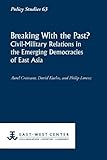Breaking with the past? : civil-military relations in the emerging democracies of East Asia / Aurel Croissant, David Kuehn, and Philip Lorenz.
Series: Policy studies (East-West Center) ; 63Publication details: Honolulu, HI : East-West Center, 2012.Description: x, 72 p. : ill. ; 24 cmISBN:- 9780866382267 (print) :
- 0866382267 (print)
- Also available online via the Internet on the EWC website.
| Item type | Current library | Home library | Collection | Call number | Materials specified | Copy number | Status | Date due | Barcode | |
|---|---|---|---|---|---|---|---|---|---|---|
| KOLEKSI ASIA TENGGARA | PERPUSTAKAAN TUN SERI LANANG | PERPUSTAKAAN TUN SERI LANANG KOLEKSI ASIA TENGGARA-P. TUN SERI LANANG (ARAS 5) | - | JQ1499.A38C768 kat (Browse shelf(Opens below)) | 1 | Available | 00002108613 |
Browsing PERPUSTAKAAN TUN SERI LANANG shelves, Shelving location: KOLEKSI ASIA TENGGARA-P. TUN SERI LANANG (ARAS 5) Close shelf browser (Hides shelf browser)
| No cover image available | No cover image available | No cover image available |

|

|

|

|
||
| JQ1419.C67. P75 kat A survey of Cordillera indigenous political institutions/ | JQ1419.C67R66 kat Issues on creating an autonomous region for the Cordillera, Northern Philippines / | JQ1419.M53A65 1995 kat Pandanggo-sa-ilaw the politics of occidental Mindoro | JQ1499.A38C768 kat Breaking with the past? : civil-military relations in the emerging democracies of East Asia / | JQ1499.A56C6665 kat Political business in East Asia / | JQ1499.A56C6665 kat Political business in East Asia / | JQ1499.A58C47 kat Changing values in Asia : their impact on governance and development / |
Includes bibliographical references (p. [59]-72).
In recent decades, several East Asian nations have undergone democratic transitions accompanied by changes in the balance of power between civilian elites and military leaders. These developments have not followed a single pattern: In Thailand, failure to institutionalize civilian control has contributed to the breakdown of democracy; civil-military relations and democracy in the Philippines are in prolonged crisis; and civilian control in Indonesia is yet to be institutionalized. At the same time, South Korea and Taiwan have established civilian supremacy and made great advances in consolidating democracy. These differences can be explained by the interplay of structural environment and civilian political entrepreneurship. In Taiwan, Korea, and Indonesia, strategic action, prioritization, and careful timing helped civilians make the best of their structural opportunities to overcome legacies of military involvement in politics. In Thailand, civilians overestimated their ability to control the military and provoked military intervention. In the Philippines, civilian governments forged a symbiotic relationship with military elites that allowed civilians to survive in office but also protected the military's institutional interests. These differences in the development of civil-military relations had serious repercussions on national security, political stability, and democratic consolidation, helping to explain why South Korea, Taiwan, and, to a lesser degree, Indonesia have experienced successful democratic transformation, while Thailand and the Philippines have failed to establish stable democratic systems.
Also available online via the Internet on the EWC website.
There are no comments on this title.

